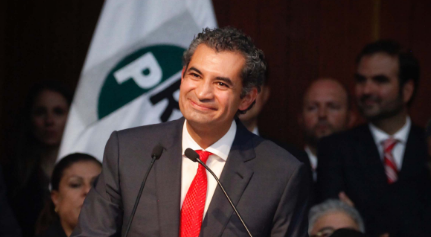Latin America Advisor
A Daily Publication of The Dialogue
Where Will a New Leader Take Mexico’s PRI?

Enrique Ochoa on July 12 was named the new president of Mexico’s ruling Institutional Revolutionary Party, or PRI. A close ally of President Enrique Peña Nieto, Ochoa took the helm of the PRI promising to renew the party and make it more transparent. What does Ochoa bring to the PRI and to Peña Nieto’s government? What must Ochoa do to root out corruption in the party, which has rankled voters, and will he have the determination to take such action? What does Ochoa’s experience in the Energy Ministry and at the CFE state electricity utility say about how he will lead the PRI?
Raúl Benitez Manaut, researcher at the Center for Interdisciplinary Research in Science and Humanities at the National Autonomous University of Mexico (UNAM): "As president of the PRI, Enrique Ochoa replaces Manilo Fabio Beltrones, who was blamed for the party’s election failures in June, especially in three states—Chihuahua, Veracruz and Quintana Roo—where the governors are also accused of far-reaching corruption. Analysts also affirm that the population’s fatigue with corruption resulted in the PRI’s election failures. All the politicians are also looking ahead to the 2018 presidential election. Only one candidate, Andrés Manuel López Obrador, of the MORENA party, is considered to be from the populist left. Ochoa is a friend of President Peña Nieto; he has almost no political experience with the PRI and he has never been elected to office. His appointment signifies a change in generation as younger officials who are around 50, of the president’s generation, are taking more important positions. Meantime, the old dinosaurs are leaving important public and political posts. Ochoa promised to fight corruption and to investigate governors and other officials accused of graft. President Peña Nieto now controls the PRI through his friend Ochoa, but that is no guarantee that the PRI’s course will be corrected. The issue of corruption is the top worry of Mexicans as the 2018 presidential election approaches."
Pamela K. Starr, associate professor of public diplomacy and international relations at the University of Southern California: "The selection of Enrique Ochoa as the new PRI president brings in a loyal technocrat with an outsider image, a reputation for integrity and proven political skills despite never having held elected office. The decision to impose Ochoa on the party reflects President Peña Nieto’s conclusion that the party’s weak electoral performance over the past two years is due to the failure of party leaders. Ochoa’s appointment brings the party back under tight presidential control. Any rooting out of corruption in the party, however, will be limited. But this is not the essence of Ochoa’s mandate, which is instead to ensure PRI victories in the 2017 gubernatorial election in Mexico State and the 2018 presidential election. Ochoa’s appointment, together with an anti-corruption system with real teeth and the attorney general’s recent challenge of legislation approved in two states to shelter outgoing PRI governors from prosecution for corruption, is instead designed to improve the party’s image in an electorate fed up with corruption. But to win elections, the PRI must also remain united. Ochoa’s appointment has deepened divisions in a party whose state and local leaders blame the PRI’s electoral difficulties on the president’s mistakes and his low approval ratings. The president’s apology for the consequences of the Casa Blanca scandal during his speech announcing the new anti-corruption system was thus directed at PRI politicians as much as the Mexican public. This electoral necessity will prevent the president, a devoted PRI politician, from allowing Ochoa to clean up the party."
James R. Jones, member of the Advisor board, chairman of ManattJones Global Strategies and former U.S. ambassador to Mexico: "Without having any inside information, it seems to me that President Peña Nieto is continuing his auditions for who would be the best PRI candidate for president in 2018. He has four cabinet ministers (Interior, Finance, Sedesol and Education) who have good credentials but who also have some shortcomings. Since the PRI as a party tops out on opinion polls around 40 percent or under, the most electable candidate is needed to retain power of the presidency. Enrique Ochoa clearly qualifies on business leadership, having successfully navigated CFE through the difficult changes of implementing the historic energy reforms for electricity. He is considered smart and honest, the latter qualification being perhaps in most demand in 2018 as the Mexican electorate views battling corruption among its most important concerns. Ochoa’s political skills are yet untested, certainly at the major league level. Heading the PRI will be his test. If he can broaden the base of public support for the PRI by candidly talking about corruption even within his party and offering solutions to change that, he will be a very strong contender for the presidency in 2018. He certainly knows how to market reforms to a broader public while not alienating or diluting what President Peña Nieto has accomplished. While the president undoubtedly will resume the PRI practice of choosing his successor, he will do so with electability at the forefront of his mind. So the auditions continue."
The Latin America Advisor features Q&A from leaders in politics, economics, and finance every business day. It is available to members of the Dialogue's Corporate Program and others by subscription.



















